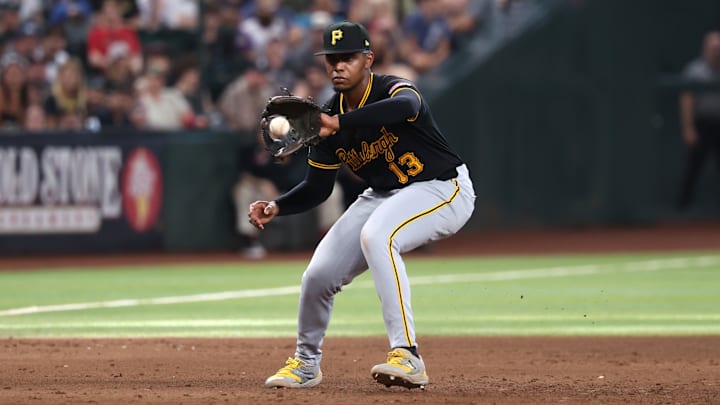It's time to admit it: Ke'Bryan Hayes has not turned out to be the player the Pittsburgh Pirates thought they were getting when they signed him to an eight-year, $70-million contract in 2022.
Sure, he's an elite defensive third baseman when he's firing on all cylinders, and he won the National League Gold Glove last season when he had 22 defensive runs saved. But there comes a time when an above-average glove can no longer make up for a below-average bat.
Hayes has struggled greatly at the plate this season, slashing just .239/.292/.296. Those numbers are even more of a disappointment when you consider that he finished last year on a high note, slashing .299/.335/.539 in 49 games after the All-Star break. This season, however, his offensive numbers after the All-Star break have dipped to an abysmal .205/.255/.205. In his first 12 games after the break, Hayes has recorded five runs on nine hits and just two RBI.
The Pirates certainly need a better showing from Hayes in the second half of the season if they have any hope of contending for their first postseason berth since 2015. Pittsburgh ranks 22nd among all MLB teams in runs per game with a 4.18 and are 29th with a team OPS of .669. Hayes' most productive month by far last season was August, when he erupted for 13 runs and 20 RBI on 31 hits and slashed .320/.368/.588, so perhaps the best is still yet to come from him this season.
Still, the overall pattern of inconsistency (and mostly a lack of production) has become increasingly difficult to ignore and leaves us wondering whether he could have been more valuable to the Pirates as a trade chip this season than as an underperforming bat in their lineup.
Pirates should've ended Ke'Bryan Hayes experiment at 2024 trade deadline
There are easily at least 20 teams that could've been mildly interested in trading for Hayes. It's hard to imagine that any number of contending teams with holes at third base, the Los Angeles Dodgers and New York Yankees chief among them, wouldn't ponder the chance to acquire a 27-year-old elite defensive third baseman with several years of team control remaining on his contract.
Despite his injury history and struggles at the plate, Hayes' defense alone would make him an attractive, long-term addition. And while his contract is hefty by Pirates standards, it would be an extremely doable financial commitment for most other teams. He could easily net Pittsburgh at least a couple of good prospects in return.
The only problem with trading Hayes now, of course, is that Pittsburgh would be selling him when his value is the lowest. Still, the Pirates now have super utility man (and Gold Glove third baseman!) Isiah Kiner-Falefa, who can actually hit. Perhaps they missed an opportunity by not trading Hayes at the deadline when they had the chance. But we'll be hoping for that August breakout again for sure.
More Pirates content from Rum Bunter
